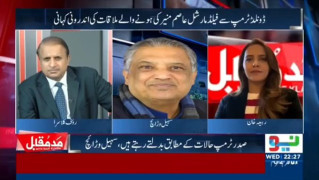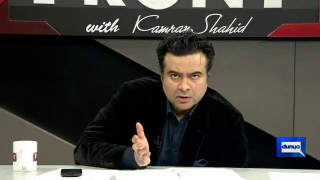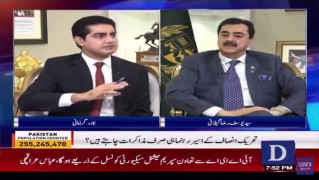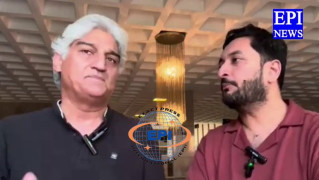PkRevolution
Chief Minister (5k+ posts)
Must Read to understand Rare Earth Politics. Pakistan's Reko Diq Mines.
For three weeks, China has blocked shipments of rare-earth minerals to Japan, a move that has boosted the urgency of efforts to break Beijing's control of these minerals. China now produces nearly all of the world's supply of rare earths, which are crucial for a wide range of technologies, including hard drives, solar panels, and motors for hybrid vehicles.
What a superpower wants.The Politics of Rare Earth
Rare earth refers to a collection of 17 elements from the periodic table, with Star Trek-sounding names like holmium, europium, neodymium, and thulium. They tend to be found together, and exhibit similar chemical properties that make them useful and in many cases vital for a whole host of high-tech applications, such as superconductors, magnets, and lasers. Rare earths are essential ingredients in many emerging green technologies, including wind turbines and batteries for electric cars. A lot of advanced U.S. military hardware, including tank navigation and naval radar systems, also depends on rare earth-based components.
28.12.2010:
Chinas commerce ministry announced on Tuesday in Beijing a steep reduction in export quotas for rare earth metals in the first months of next year, a move that threatens to cause further difficulties for manufacturers already struggling with short supplies and soaring prices.
The reduction in quotas for the early months of 2011 a 35 percent drop in tonnage from the first half of this year is the latest in a series of measures by Beijing that has gradually curtailed much of the worlds supply of rare earths.
China mines more than 95-97 percent of the global supply of the metals, which are essential for smartphones, electric cars, many computer components and a range of military hardware. In addition, the country mines 99 percent of the least common rare earths, the so-called heavy rare earths that are used in trace amounts but are crucial to many clean energy applications and electronics.
China gradually reduced its annual tonnage of export quotas from 2006 to 2009, then cut the tonnage of allowed exports by more than half in the second half of 2010.
Chinas latest restrictions drew a quick response from the Office of the United States Trade Representative in Washington.
We are very concerned about Chinas export restraints on rare earth minerals, a spokeswoman for the office, Nefeterius Akeli McPherson, said. We have raised our concerns with China and we are continuing to work closely on the issue with stakeholders.
Business leaders and officials in Europe have also raised the alarm, especially in Germany, where a large manufacturing sector relies heavily on imports of Chinese rare earths.
Until a few months ago, Chinese officials said that their rare earth policies were aimed at forcing foreign industries to move high-tech factories to China so as to have access to Chinese rare earths. But as trade frictions have increased, they have given greater emphasis to environmental concerns.
Gold, Copper and Rare Earths at Pakistan's Reko Diq Could Exceed $500 Billion
The sale of Reko Diq mining rights is currently being reviewed by Pakistan Supreme Court in response to allegations of lack of transprarency. The entire discussion in the courtroom is primarily centered on valuations and estimates of traditional metals like gold and copper. The second topic of discussion in the apex court is about the absence of any contract provisions for development of downstream job-creating industries to extract these metals.
What is conspicuously absent from the debate is the potential for extraction at Reqo Diq of rare earth elements that are even more precious and in much greater and growing demand for the latest high-tech equipment and batteries for all-electric autos, communications, and other applications than traditional precious metals like gold and silver. It is the estimates of these rare earths at Reqo Diq that could put the value of the contract at considerably more than the current best estimates of $500 billion for copper and gold.
A current production Toyota Prius nickel metal hydride battery pack uses 30 kilograms of nickel, 2 kilograms of cobalt and 12 kilograms of lanthanum because the active hydrogen storage alloy in the battery is either LaNi4.5Co0.5 or (Ce, La, Nd, Pr)Ni5. The Prius assembly plant in Japan has so far used one and 1.5 million rechargeable nickel metal hydride battery packs and achieved with them some of the lowest numbers of service issues ever seen in the OEM automotive industry. In fact most of the original Prius rechargeable nickel metal hydride battery packs have exceeded their 8-year 100,000 mile warranty and are still functioning, according to Resource Investor website.
We Must stop Canada from taking out Rare Earths from Pakistan. Barak Gold is behind this game. Tethian is a daughter firm of Barrick gold.
This matter is not to leave on Baluchistan's chief Minister and team to handle. Highly Qualified Team required also a think tank to make decision in national interests.
Pakistan has everything, we need a perfect leader and highly qualified management team to handle such matters in national interest.
An Interesting German Film Link on Rare Earths. (German Language)
http://www.3sat.de/mediathek/mediathek.php?obj=23601&mode=play
[video]http://www.3sat.de/mediathek/mediathek.php?obj=23601&mode=play[/video]
__________________________________________________ ______________
Even Russia (magnesium), Brazil (niobium), India (graphite) and the Democratic Republic of Congo (cobalt) are important suppliers of raw materials for high-tech products.
For three weeks, China has blocked shipments of rare-earth minerals to Japan, a move that has boosted the urgency of efforts to break Beijing's control of these minerals. China now produces nearly all of the world's supply of rare earths, which are crucial for a wide range of technologies, including hard drives, solar panels, and motors for hybrid vehicles.
What a superpower wants.The Politics of Rare Earth
Rare earth refers to a collection of 17 elements from the periodic table, with Star Trek-sounding names like holmium, europium, neodymium, and thulium. They tend to be found together, and exhibit similar chemical properties that make them useful and in many cases vital for a whole host of high-tech applications, such as superconductors, magnets, and lasers. Rare earths are essential ingredients in many emerging green technologies, including wind turbines and batteries for electric cars. A lot of advanced U.S. military hardware, including tank navigation and naval radar systems, also depends on rare earth-based components.
28.12.2010:
Chinas commerce ministry announced on Tuesday in Beijing a steep reduction in export quotas for rare earth metals in the first months of next year, a move that threatens to cause further difficulties for manufacturers already struggling with short supplies and soaring prices.
The reduction in quotas for the early months of 2011 a 35 percent drop in tonnage from the first half of this year is the latest in a series of measures by Beijing that has gradually curtailed much of the worlds supply of rare earths.
China mines more than 95-97 percent of the global supply of the metals, which are essential for smartphones, electric cars, many computer components and a range of military hardware. In addition, the country mines 99 percent of the least common rare earths, the so-called heavy rare earths that are used in trace amounts but are crucial to many clean energy applications and electronics.
China gradually reduced its annual tonnage of export quotas from 2006 to 2009, then cut the tonnage of allowed exports by more than half in the second half of 2010.
Chinas latest restrictions drew a quick response from the Office of the United States Trade Representative in Washington.
We are very concerned about Chinas export restraints on rare earth minerals, a spokeswoman for the office, Nefeterius Akeli McPherson, said. We have raised our concerns with China and we are continuing to work closely on the issue with stakeholders.
Business leaders and officials in Europe have also raised the alarm, especially in Germany, where a large manufacturing sector relies heavily on imports of Chinese rare earths.
Until a few months ago, Chinese officials said that their rare earth policies were aimed at forcing foreign industries to move high-tech factories to China so as to have access to Chinese rare earths. But as trade frictions have increased, they have given greater emphasis to environmental concerns.
Gold, Copper and Rare Earths at Pakistan's Reko Diq Could Exceed $500 Billion
The sale of Reko Diq mining rights is currently being reviewed by Pakistan Supreme Court in response to allegations of lack of transprarency. The entire discussion in the courtroom is primarily centered on valuations and estimates of traditional metals like gold and copper. The second topic of discussion in the apex court is about the absence of any contract provisions for development of downstream job-creating industries to extract these metals.
What is conspicuously absent from the debate is the potential for extraction at Reqo Diq of rare earth elements that are even more precious and in much greater and growing demand for the latest high-tech equipment and batteries for all-electric autos, communications, and other applications than traditional precious metals like gold and silver. It is the estimates of these rare earths at Reqo Diq that could put the value of the contract at considerably more than the current best estimates of $500 billion for copper and gold.
A current production Toyota Prius nickel metal hydride battery pack uses 30 kilograms of nickel, 2 kilograms of cobalt and 12 kilograms of lanthanum because the active hydrogen storage alloy in the battery is either LaNi4.5Co0.5 or (Ce, La, Nd, Pr)Ni5. The Prius assembly plant in Japan has so far used one and 1.5 million rechargeable nickel metal hydride battery packs and achieved with them some of the lowest numbers of service issues ever seen in the OEM automotive industry. In fact most of the original Prius rechargeable nickel metal hydride battery packs have exceeded their 8-year 100,000 mile warranty and are still functioning, according to Resource Investor website.
We Must stop Canada from taking out Rare Earths from Pakistan. Barak Gold is behind this game. Tethian is a daughter firm of Barrick gold.
This matter is not to leave on Baluchistan's chief Minister and team to handle. Highly Qualified Team required also a think tank to make decision in national interests.
Pakistan has everything, we need a perfect leader and highly qualified management team to handle such matters in national interest.
An Interesting German Film Link on Rare Earths. (German Language)
http://www.3sat.de/mediathek/mediathek.php?obj=23601&mode=play
[video]http://www.3sat.de/mediathek/mediathek.php?obj=23601&mode=play[/video]
__________________________________________________ ______________
Even Russia (magnesium), Brazil (niobium), India (graphite) and the Democratic Republic of Congo (cobalt) are important suppliers of raw materials for high-tech products.
Last edited:
































